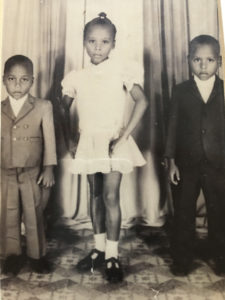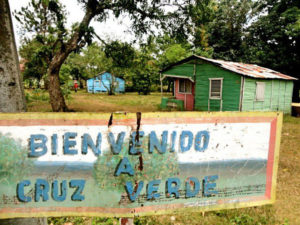Victoria Santos: Commonweal’s New Director of Special Initiatives
by Kyra Epstein, Commonweal Communications
Victoria Santos grew up in Cruz Verde, a rural inland village of 200 farming families in the Dominican Republic. A short journey north of Santo Domingo and the Caribbean Sea, Cruz Verde is home to Dominicans of African descent living in economic poverty. Victoria’s childhood was filled with celebrations and rituals, music and singing, community cooking, and eating in shared courtyards. In a village where electricity was occasional, Victoria grew up immersed in the power of the natural world, with afternoon Caribbean rains pounding on tin roofs, or walking barefoot under the tropical sun to delight in gathering mangos. She developed a keen attentiveness to the energy of people and groups during moonlit evenings of community conversation and storytelling.

“Our village was materially poor, but culturally rich,” she said. “Our community rituals and celebrations are what kept us together. During my childhood, this time of year, before Christmas, we would slaughter a pig, make chicharrón (pork rind), yuca empanadas, sweet beans, and many other dishes. It was a whole day affair: in the courtyards together as a community, cooking and tending to the fire and playing palo—traditional drumming with singing. The whole community was involved.”
When she was 11 years old, she moved to join her family in the South Bronx in New York. Her grandfather and mother—like many Dominicans who fled the Trujillo regime at the time—had already immigrated to the United States. Though still rooted in the Dominican culture of her family and community, she experienced significant culture shock in New York. Leaving Cruz Verde’s palm trees and dirt roads for the harsh concrete and icy winters of her new home, she grappled with learning English, navigating the South Bronx, and entering new schools with new people. Deepening her own resiliency and inner resources, and viewing dominant U.S. culture through the eyes of a Black young woman immigrant, Victoria evolved her capacity to quickly discern the ways that different people carry culture, identity, and perception of self and others.

Studying at the University of Albany, she had many interests: international relations, environmental management, political science, Latin American studies, and psychology. Carrying her home village in her heart, she wanted to find a way to help the people of Cruz Verde and others living with the pain of poverty and injustice.
While studying for her bachelor’s degree, she worked part-time at Holding Our Own, a multiracial, multicultural organization led by women of color, dedicated to advancing feminist social change.
“There, I collaborated with a group of powerful thinkers and activists including Vickie Smith, Naomi Jaffe, Nadia Lawson, and Barbara Smith,” she said. “These women combined clear and penetrating awareness of cultural-historical realities with a fearless commitment to changing our world. In their work for racial and gender justice, ending the carceral state, and many related issues, these dear friends helped me to further cultivate an intersectional analysis and apply it to my own social change movement work.”
After earning a bachelor’s in psychology, in the process of obtaining her master’s degree in Latin American and Caribbean studies, Victoria volunteered, studied and traveled through Central America, studying the maquiladoras in Mexico, environmental policies in Costa Rica, and social movements in El Salvador.
Back in New York, she continued to do community organizing, now working with youth. But she was ready for a change.
“I didn’t think I had the skills to manage the intensity of it all,” she said. “I hit a wall and needed a break, and I ended up at the Kripalu Center in Massachusetts. I started to put some of the pieces together: finding ways to marry activism, spirituality and health/wellness.”
While living and working at the Kripalu Center, she was certified as a yoga teacher, became a massage therapist, and learned about meditation and facilitating groups. In September 1998, Caroline Myss and Suzanne Fageol came to speak at the center. At dinner, after Victoria shared her desire to work with youth in a new way, they asked her: “Have you ever been to Whidbey Island?” Caroline and Suzanne “strongly” suggested that Victoria go there to meet Peggy Taylor and Charlie Murphy. Soon after that, in December 1998, Victoria and Tamara Shulman—who had also been at Kripalu—traveled cross-country to Whidbey Island to help set up Power of Hope.
“I’ve been on Whidbey ever since,” Victoria said. She eventually co-established the nonprofit Sister Island Project with her friend and collaborator Peter Blaustein. They worked for more than 15 years with the community of Cruz Verde, and other communities in the local Yabacao region, to bring hundreds of international volunteers, build a community learning center, construct hurricane-safe houses, and partner with Rotary Clubs and others to bring clean water to the village, provide medical aid to elders and those facing serious health issues, and offer scholarship support to university students from the villages.
Another aspect of Victoria’s journey unfolded when she reconnected to Sobonfu Somé (whom she had met at Kripalu), a wisdomkeeper of the Dagara people of Burkina Faso. Victoria assisted Sobonfu in facilitating grief rituals in the Dagara tradition over a number of years. Working with Sobonfu, Victoria became increasingly interested in healing trauma. She studied multiple approaches to facilitating healing, incorporating somatic awareness and meditative practices, and she gained certification as a facilitator of Judith Blackstone’s Realization Process.
Ten years ago, Victoria began working with an organization called Young Women Empowered. Eventually serving co-director of the organization, they guided mentorship-based learning programs for young women in the greater Seattle and Puget Sound area. In her work with Young Women Empowered, Victoria coordinated a wide range of community events and change-making initiatives designed to shift dominant cultural narratives and support young women in speaking their truths and acting together for racial, gender, and environmental justice.
She facilitated the Winter Gathering at Whidbey, met Commonweal’s Elise Miller, and joined the board of Commonweal’s Collaborative on Health and the Environment. When the Gathering model was brought to Commonweal, Rick Ingrasci and Peggy Taylor asked her to help facilitate the first Commonweal Fall Gathering.
“I loved the people and the land at Commonweal,” she said. “The following year, they asked me to carry the hosting for the Fall Gathering, and I was introduced to many more wonderful people. Commonweal felt like the next expression of my engagement and service—bringing in all the threads from my life’s work. Commonweal’s mission is very aligned with my own. We are one planet… everything is connected, and everything I do impacts everyone else. That awareness is held at Commonweal and I want to support that vision and knowing.”
This fall, Victoria officially joined the Commonweal staff as Director of Special Initiatives, with a mission to “support the evolution and vision of Commonweal.” She is in the process of developing new programs at Commonweal, working with Commonweal staff and creating bridges with partners to strengthen new collaborative efforts. She also continues to work with Oren Slozberg on the Fall Gathering, and is working to find ways to expand the Fall Gathering through the year with additional events.